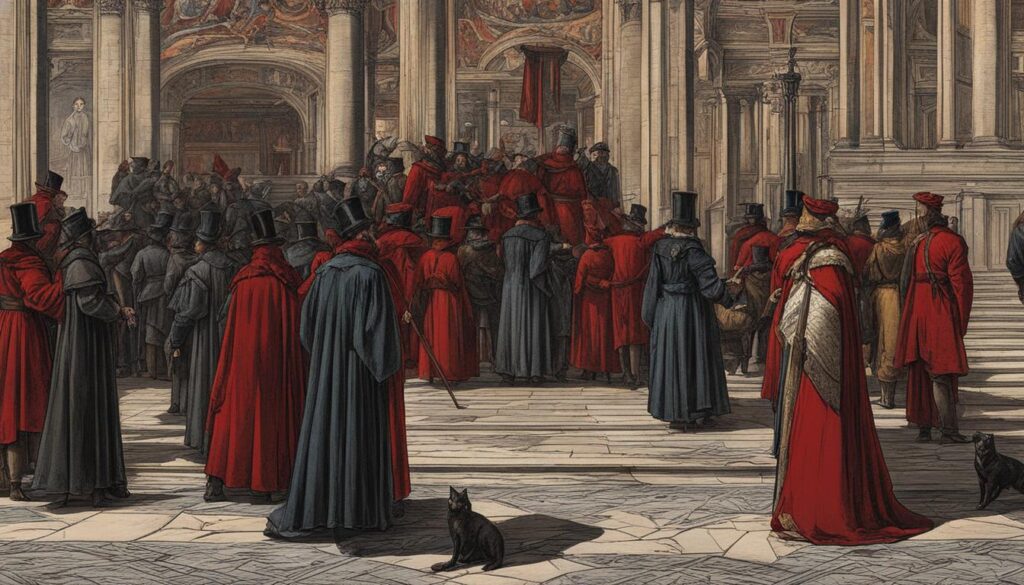If you’re a fan of historical mysteries and literature, Matthew Pearl’s “The Dante Club” audiobook is a must-listen. In this review, we’ll dive into the intricate plot, compelling characters, and overall experience of this intriguing novel.
Key Takeaways
- “The Dante Club” by Matthew Pearl is a historical mystery novel that is sure to captivate fans of the genre.
- The audiobook version of the novel is a compelling listening experience that brings the story to life.
- The novel’s characters are well-developed and play crucial roles throughout the narrative.
- The blend of literature and intrigue, in addition to the historical accuracy, make this novel an excellent choice for readers who love history and literature.
- The critical reception of “The Dante Club” is mostly positive, with praise for the author’s writing style and attention to historical detail.
Overview of “The Dante Club”
The Dante Club is a historical mystery novel written by Matthew Pearl that was published in 2003. The book is set in Boston in the aftermath of the American Civil War and centers around a group of literary scholars who are also investigating a series of gruesome murders that are inspired by Dante Alighieri’s The Divine Comedy.
Matthew Pearl is an American author who has published several other historical mystery novels, including The Last Dickens and The Poe Shadow. His work is known for its meticulous research and attention to detail, as well as its ability to create a vivid sense of historical time and place.
Plot Summary
“The Dante Club” by Matthew Pearl is a thrilling historical mystery novel set in Boston in 1865, shortly after the end of the Civil War. The narrative centers around a group of literary scholars – including Henry Wadsworth Longfellow and Oliver Wendell Holmes – who are attempting to translate Dante’s “The Divine Comedy” into English. However, their efforts are impeded by a series of gruesome murders, the victims of which seem to have been inspired by Dante’s work.
The novel’s protagonist, Boston police officer Nicholas Rey, is tasked with solving the crimes. As he delves deeper into the investigation, he is forced to navigate the complex web of relationships between the Dante Club members, all while racing against time to prevent further murders.
Throughout the novel, readers are kept on the edge of their seats by a series of unexpected twists, turns, and red herrings. By the heart-racing conclusion, all of the pieces finally come together in a satisfying and climactic finale.
Overall, “The Dante Club” is a complex and engaging mystery that is sure to keep readers guessing until the last page.
“A thrilling historical mystery novel set in Boston…complex and engaging mystery that is sure to keep readers guessing until the last page.”
Characters in “The Dante Club”
Matthew Pearl’s “The Dante Club” features an array of complex and compelling characters. From literary scholars to detectives, each character plays a crucial role in the story’s development and ultimately contributes to the novel’s overall impact.
Henry Wadsworth Longfellow, a poet and Harvard professor, is a key character who initially unites the group. Longfellow strives to translate “The Divine Comedy,” contributing to the collaborative work of “The Dante Club.”
Oliver Wendell Holmes Sr., a physician and professor, brings a unique perspective to the group. He utilizes his medical knowledge to better understand the crime scene and provide insight into the killer’s motives.
James Russell Lowell, a poet and a scholar, has a shaky relationship with Longfellow but still contributes to the translation. His position as editor-in-chief of the Atlantic Monthly creates tensions between him and Longfellow, leading to explosive confrontations.
Nicholas Rey, the detective leading the investigation, struggles to keep up with the serial killer and the demands of his superiors. His determination to catch the killer sometimes risks his safety and health.
Dr. Oliver Wendell Holmes Jr. assists his father and shares his medical knowledge to help with the murder investigation.
Other Characters
Luigi Porta, an Italian immigrant, is one of the murder victims. George Gordon, a talented artist and Longfellow’s assistant, also meets a tragic end. Phoebe Adams, a maid in Longfellow’s home, provides a pivotal clue to the case. Other essential characters include Charles Eliot Norton, George Washington Greene, and William Dean Howells.
Each character in “The Dante Club” brings a unique perspective and motive to the story, ultimately contributing to its unforgettable impact.
Writing Style and Themes
Matthew Pearl’s writing style in “The Dante Club” is both intricate and engaging. His use of descriptive language brings the setting of 1860s Boston to life, immersing the reader in the historical time and place. Pearl’s attention to detail extends to his characters, who are well-developed and realistically flawed.
The novel explores several major themes, including the power of words, spirituality, and the relationship between literature and society. The overarching theme is the influence of Dante’s work on the characters, reflecting on its relevance to contemporary society.
“The book is a testament to the power of words, both for good and for evil. It emphasizes how dangerous ideas can spread through language.”
The themes complement the writing style well, enhancing the emotional depth and intellectual breadth of the story. Overall, “The Dante Club” is a thought-provoking novel that explores complex ideas with great skill and nuance.

Narration and Audiobook Experience
When it comes to audiobooks, narration quality is paramount in creating an enjoyable listening experience. The audiobook edition of “The Dante Club” certainly delivers in this regard. Narrator Boyd Gaines brings the characters to life with his expressive performance.
Gaines captures the essence and personality of each character, making it easy for listeners to distinguish between them. Furthermore, his melodious voice infuses each scene with the appropriate tone, whether it’s the tension of a suspenseful moment or the pathos of a poignant scene.
In addition to the quality of the narration, the audiobook format itself enhances the experience of “The Dante Club.” For example, sound effects like the flipping of pages and the sound of footsteps help to immerse the listener in the setting and atmosphere of the story.
Pros:
- Expressive and engaging narration
- Well-suited sound effects enhance the listening experience
Cons:
- May not appeal to those who prefer reading physical books
- Some listeners may find the sound effects distracting
“The audiobook edition of ‘The Dante Club’ is a fantastic way to experience Matthew Pearl’s historical mystery novel. From the standout narration to the well-placed sound effects, this audiobook is sure to captivate listeners.”
Historical Accuracy and Research
Matthew Pearl weaves a beautiful blend of fiction and history in “The Dante Club”. Through extensive research, Pearl successfully captures the essence of Boston in the 19th century. Historical accuracy is one of the book’s notable strengths. The descriptions of the city and its landmarks are particularly vivid – readers can almost feel the cobblestone streets under their feet.
The author worked tirelessly to ensure that the book contains accurate depictions of Boston during a time of great cultural change. Pearl meticulously researched 19th-century literature to ensure that the book’s poet characters were representative of real-life poets of the time. This dedication to historical accuracy makes “The Dante Club” an enjoyable and informative read for anyone interested in history and literature of the era.

Besides literary and cultural details, the novel also explores the cultural, socio-economic, and political climate of Boston in that era. From the conditions of printing houses to the architectural styles of the city, the book provides fascinating insights into the multiple layers of historical context.
“Pearl’s elegant writing style, combined with his elaborate research, result in a harmonious blending of historical fiction and mysteries.” – Bloomsbury Review
The research that went into creating “The Dante Club” is evident in every chapter. It’s refreshing to read a work of historical fiction where the details aren’t just accurate – they enrich the story and make it more engaging. Pearl’s combination of research and creative prose offers readers a glimpse into a crucial moment in American history.
Critique and Reception
Since its publication in 2003, “The Dante Club” has been received with mixed reviews. Some critics applauded Pearl’s creative approach to blending history, literature, and mystery, while others found fault with the pacing and development of the characters.
Writing for The New York Times, Janet Maslin stated that “Matthew Pearl has written a literate and macabre thriller that does honor to the memory of both Dante and Poe,” praising the novel’s historical accuracy and vivid descriptions of 19th-century Boston. Similarly, Publishers Weekly declared it a “terrific debut,” noting that the novel’s “complex and multilayered plot succeeds through intricate plotting and lush detail.”
However, not all critics were as enamored with “The Dante Club.” Kirkus Reviews criticized the novel’s “labored pace” and convoluted plot, while The Washington Post lamented the “disappointingly derivative” characters and underdeveloped literary analysis.
Despite the mixed critical reception, “The Dante Club” remains a popular historical mystery novel beloved by many readers. Its combination of literary references, historical detail, and intrigue make it a unique and engaging reading experience.
Conclusion
In conclusion, “The Dante Club” is a must-read historical mystery novel for fans of the genre. The audiobook version, narrated by Boyd Gaines, adds an immersive and engaging element to the already gripping storyline. Matthew Pearl’s writing style shines in this intricate narrative, exploring themes of literature, history, and the power of words.
The characters are well-developed and add depth to the novel, while the level of historical accuracy and research is impressive. The setting effectively transports the reader to 1860s Boston, and the plot twists keep the reader engaged until the final page.
While there are some critiques of the novel, overall, “The Dante Club” has received positive critical reception and is definitely worth a read. Whether you’re a literary scholar, history buff, or mystery lover, this novel has something to offer.



